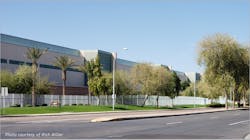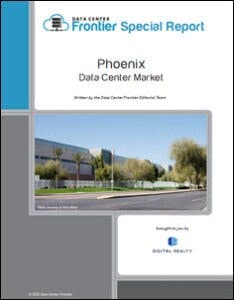Tax Incentives and Connectivity Drive Phoenix Data Center Market Growth
This week we conclude our special report series on the Phoenix data center market by looking at the region’s business environment, including the tax incentives that make it attractive to operators.
Get the full report.
Power Overview
Power costs in Arizona are well below the national average. Similar to the Los Angeles market, Phoenix is served by a public utility provider of power and water, the Salt River Project (SRP). An integrated utility, SRP provides electric generation, transmission, and distribution services in the Phoenix metro area. A privately-owned competing electric provider, Arizona Public Service (APS), serves most of the Phoenix market where data centers are clustered. Both SRP and APS offer a diverse fuel mix that includes renewable sources such as hydroelectric and solar. Phoenix’s plentiful sunshine is a double-edged sword for the data center industry: It offers an almost year-round source of “green” energy (driving public and private investments in solar power infrastructure construction, largely to accommodate a major Apple manufacturing facility in the area) but also requires more electricity to cool data centers during the area’s numerous days of over 100-degree Fahrenheit temperatures.
More electricity to cool data centers is required in the Phoenix area during the numerous days of over 100-degree Fahrenheit temperatures.
Hazard Risk Overview
Phoenix is rated as a low risk for all types of natural disasters. Hurricane damage is non-existent, floods are uncommon, and there are no major fault lines to cause seismic events in the Phoenix market.
Tax Incentives Overview
In an effort to lure data centers to the Phoenix market, Arizona offers a ten-year wavier on state, county, and local sales taxes on both equipment purchases and labor services for data centers. If the data center qualifies as a Sustainable Redevelopment Project, however, the waiver is increased to 20 years.
Connectivity Overview
Phoenix has quality fiber infrastructure. Lumen, Electric Lightwave/Integra, Sprint, XO, and Zayo all run long-haul fiber connections through Phoenix. Carriers such as ICFN, Syringa, Tru Com, and Windstream have developed locally focused fiber networks. Municipal fiber is available in Mesa, AZ to serve the area’s data centers.
Digital Realty’s Phoenix campus offers a robust connected community and is the #1 interconnection hub in the metro with access to 100+ IT, network, cloud, IT service providers and enterprise customers. As part of the PlatformDIGITAL, customers can deploy locally and scale globally as their business needs require.
Download the full report, Phoenix Data Center Market, courtesy of Digital Realty, or an exclusive look at key service providers in the Phoenix market. The report profiles more than 20 data center operators in the region.



